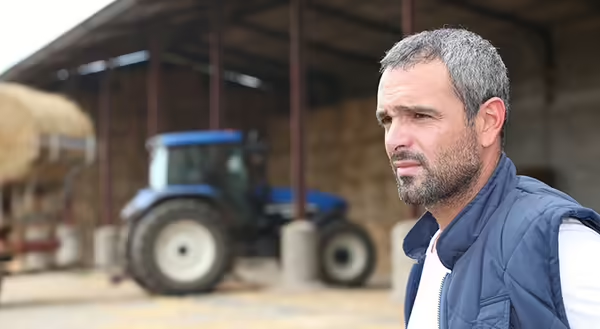
Suicide rates are higher for farmers than any other occupation
Think about that for a moment.
Farm life is stressful. Most pressures are constant and uncontrollable. Machinery breaks, weather delays work and commodity prices fluctuate. The work can be isolating. And between prices and trade wars, this has been an extremely difficult few years for Illinois farmers.
Josie Rudolphi is an assistant professor of agricultural and biological engineering at University of Illinois. Through her research, Rudophi has found that up to 60% of young farmers reported mild symptoms of depression and 70% reported mild anxiety.
“We know stress and anxiety is a problem in the population, and we know access to mental health care is not always available in rural areas,” Rudolphi said.
The agricultural landscape has changed rapidly in the past decades, leading to a lot of uncertainty. Farmers are aging – 62% of Illinois farmers were 55 or older, according to the USDA 2017 Census of Agriculture. They have more intense business management responsibilities and they are pressured to keep up with technological and production advances. Add to this list everyday family issues, health concerns and financial worries – and it is no wonder the National Safety Council ranked agriculture as one of the top two most hazardous occupations.
Prolonged stress reduces problem-solving abilities. And on a farm, poor decision making can lead to injury.
Chronic stress can take a huge toll on a person’s physical and mental health. It can lead to depression, anxiety and even suicidal thoughts or action. Prolonged stress can change the brain's structure and how it functions, which can lead to impaired thinking.
Some symptoms of stress include:
- Physical – Muscle aches, frequent headaches, frequent upset stomach and fatigue.
- Behavioral – Difficulty sleeping, irritability and easy to anger, inability to focus, difficulty making decisions and increased use of alcohol/drugs.
- Emotional – Feelings of anxiety, panic, frustration, impatience, restlessness, isolation, hopelessness and discouragement.
- Relationships – Communication difficulties and maybe conflict with family members and friends, strained interactions, avoidance of others and verbal or physical outbreaks.
Everyone handles pressure and copes with stress differently. Feelings of emotional distress, anxiety, depression, anger, suicidal thoughts, and substance abuse are all potential warning signs. Sometimes people aren’t aware of the warning signs, some ignore them, and some have become so accustomed to them that they don’t realize the danger they are in. Others may be concerned about mental health stigmas.
People in rural communities are willing to help others, but rarely ask for favors or seek professional help.
It is not always easy or comfortable to ask someone how someone is doing in stressful times, but more often than not, people will feel relieved that someone noticed, that someone cares. This might be all it takes.
And farmers want information from their innermost circles, their trusted friends and family members. But if that does not feel appropriate, a doctor or local health department can provide information, treatment or referrals. If you run into difficulty or resistance, suggest and accompany the person to a professional such as a clergy member, health-care professional, law enforcement agencies, and local counselors, social workers or other mental health professionals.
In severe or life-threatening situations where there is imminent danger, call 911, drive them to someone they trust, but please don’t leave them alone.
Resources
- National Suicide Prevention Lifeline: 1-800-273-8255
- National Suicide Prevention Crisis Chat: https://suicidepreventionlifeline.org/talk-to-someone-now
- Crisis Text Line: Text “GO” to 741741
- Veterans Crisis Line: 1-800-273-8255 or online chat
- Greater Chicago/Illinois Chapter of American Foundation for Suicide Prevention: (312) 890-2377
- National Alliance on Mental Illness Helpline: 1-800-950-6264
- Substance Abuse and Mental health Services National Helpline: 1-800-662-4357
- The American Institute for Stress: www.stress.org
- National Institute of Mental Health: www.nimh.nih.gov
Doug Gucker is a Local Food Systems and Small Farms educator with University of Illinois Extension in DeWitt, Macon and Piatt counties. He improves producer profitability and sustainability through demonstration and programming focused on using appropriate management strategies, soil health, nutrient management, integrated pest management, cover crops, beekeeping, grazing and urban farming. You can contact him at 217.877.6042, dgucker@illinois.edu or follow him on Twitter at @SoilWaterDoug.